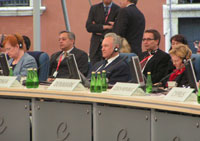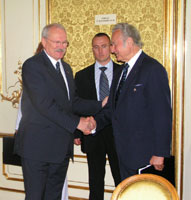| |
 | Press Releases | | |
The President of the President addresses the Summit of the Council of Europe16.05.2005
 President Arnold Rüütel participated in the 3rd Summit of the Council of Europe that opened in Warsaw today, and met with the heads of several delegations. President Arnold Rüütel participated in the 3rd Summit of the Council of Europe that opened in Warsaw today, and met with the heads of several delegations.
Yesterday in the evening, the President of the Republic, who had arrived in Warsaw on a working visit, was greeted by the Estonian representative to the Council of Europe Alar Streimann and the Estonian Ambassador in Poland Aivo Orav. The Head of State handed over to Ambassador Aivo Orav the 4th Class Order of the White Star for his contribution to the preparation of the Estonia's accession to NATO.
Today, the President of the Republic participated in a festive greeting ceremony in the Royal Castle in Warsaw and in the meeting of heads of delegations following it. Today's programme of the Summit included two sessions: ''European unity, European values'' and "Challenges for the European Society". The Prime Minister of the Republic of Poland hosted a lunch for the delegations. During the second session, President Rüütel made a speech in which he introduced the viewpoints of Estonia.
In his speech, the Head of Estonian state stressed the role of the Council of Europe in defending European values and working in the name of a more unified, democratic and freer Europe for more than half a century already. "We all are aiming that such European values as freedom, democracy and recognition of human rights would become supporting pillars for states. The Council of Europe has to stand firm in its support to rooting of European values during the time consuming process of instilling democratic culture," the president of the Republic said.
At the same time, in the words of President Rüütel, not all developments have been positive in Europe in recent years. The Head of Estonian state pointed out the concerns caused by the situation in Byelorussia, the Transnistria crisis in Moldova, and the appearance of new global security risks, such as the terrorist attacks in Madrid and Beslan. "The values underlying our policies and positions are of extreme significance. In order to ensure spread of democracy, relations between states cannot be based on narrow economic interests," the President of the Republic stressed.
President Rüütel spoke also about the different meaning of the end of World War II for the nations of Western and Eastern Europe, but also about the need to become reconciled and to rise above the past. "A free and democratic Europe cannot embark on half-truths - in order to accomplish real unity, also crimes by all totalitarian regimes have to be condemned and everybody should admit the past. I stress that all this is in the interest of our common future, opening new horizons for the development of our part of the world," the President of the Republic noted.
Talking about the further development of the Council of Europe, the Head of Estonian state pointed out the necessity of focusing on activities in which the organisation has proved to be most fruitful, and giving up some less significant activities. "Features, which make the Council of Europe a strong organisation, should be preserved - representation of all European states, preventive action, and elaboration of common norms, standards and evaluation criteria. The efficient performance of the convention of Human Rights and the Court of Human Rights is extremely significant in order to ensure democracy, human rights and rule of law. However, definitely, resources of the court should be increased in order to accomplish all this. Certainly the Council of Europe should also address the issue related to indigenous people in the future," the President of the Republic said.
President Rüütel today had also bilateral meetings with the heads of delegations participating in the Summit from Macedonia, Spain, the Slovak Republic and Austria.
President of Macedonia Branko Crvenkovski introduced his country's efforts in achieving the EU and NATO membership status. The meeting also touched upon the issue of the name of the state, which the neighbouring state, Greece, has disputed since the disintegration of the former federative state of Yugoslavia. In the words of President Crvenkovski, 109 UN Member States, including three of the five permanent members of the UN Security Council - the USA, Russia and China, support the constitutional name of the state - "the Republic of Macedonia". In the words of the Head of Estonian state, the name that had been recommended by the UN - "the Former Yugoslav Republic of Macedonia", FYROM, and which was used also by the EU, was a provisional solution and that hopefully it would be possible to reach an agreement with Greece based on good will, which would satisfy both sides. Also President Crvenkovski stressed that it was important for Macedonia to have good relations with Greece. The two presidents spoke about advancement of interstate cooperation in various fields, and possibilities of introducing the reform experience of Estonia to Macedonia. President Rüütel expressed hope that also the Ambassador of Estonia to Macedonia residing in Warsaw Aivo Orav, who had presented his credentials to President Crvenkovski a couple of months earlier, and was present at the meeting, could facilitate such cooperation.
During the meeting, the Foreign Ministry of Spain Miguel Angel Moratinos said to President Rüütel that he considered the role of Estonia and the other Baltic states as important. At the same time, Spain wished to advance the bilateral relations. Talking about the further possibilities for strengthening bilateral relations, the President singled out the strong development potential of Estonian ports, and in the EU context - designing of the neighbourhood policy as an important topic for Estonia. Also the Foreign Minister of Spain pointed out the importance of the coordination of activity in that field, as well as the activity of the EU in the protection of its borders and securing stability. The meeting addressed also the EU financial perspective, and both sides expressed mutual understanding of each other's viewpoint on that issue.
 The main topic of the meeting with the President of the Slovak Republic Ivan Gašparovič was, first of all, the promotion of bilateral economic cooperation, which would hopefully benefit from the visit of the President of Slovak Republic and an accompanying business delegation to Estonia next October. The heads of state expressed mutual interest in potential joint Estonian-Slovak business projects in future, which could benefit from the development of Via Baltica project. The two presidents also talked about the EU Constitutional Treaty, which was recently ratified by the Slovak Parliament. The main topic of the meeting with the President of the Slovak Republic Ivan Gašparovič was, first of all, the promotion of bilateral economic cooperation, which would hopefully benefit from the visit of the President of Slovak Republic and an accompanying business delegation to Estonia next October. The heads of state expressed mutual interest in potential joint Estonian-Slovak business projects in future, which could benefit from the development of Via Baltica project. The two presidents also talked about the EU Constitutional Treaty, which was recently ratified by the Slovak Parliament.
The meeting with the Federal President of Austria Heinz Fischer addressed the current situation of ratification of the EU Constitutional Treaty. President Rüütel spoke about the reasons for not attending the celebrations in Moscow on May 9. The Head of Estonian state stressed that while wishing to facilitate the democratisation process in Russia, Estonia considered the active EU neighbourhood Policy and implementation of common EU foreign policy towards Russia to be important. President Fischer agreed with that viewpoint.
President Rüütel has briefly communicated with several other heads of delegations, including the Minister for Foreign Affairs of the Russian Federation Sergei Lavrov. At that ad hoc meeting, the Head of Estonian state stressed that Estonia was sincerely willing to strengthen the relations with Russia and reiterated the already earlier made proposal to resume the work of the Estonian-Russian Intergovernmental Commission.
Later this evening, President Rüütel will participate in a dinner hosted by the President of the Republic of Poland Aleksander Kwasnievski for the heads of delegations, and after that the Head of Estonian state will have a bilateral meeting with the Prime Minister of the Netherlands Jan Peter Balkenende. The President of the Republic will arrive from his working visit in Estonia on Tuesday afternoon.
The Council of Europe is a political organisation, founded in 1949, and comprising of 46 member states, the main purpose of which is to protect and strengthen democracy and human rights. The organisation has its Headquarter in Strasbourg. Estonia became a member of the Council of Europe on May 14, 1993. The Summits that took place before the current Warsaw Summit were held in Vienna in 1993 and in Strasbourg in 1997.
Public Relations Unit of the Office of the President
Kadriorg, May 18, 2005
|
| |
|